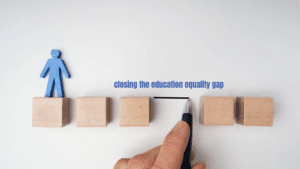Education is often hailed as the great equalizer, providing individuals with the knowledge, skills, and opportunities to succeed. However, access to Education Equity is unequal, leading to disparities in academic achievement and socioeconomic outcomes. Education equity and access aim to address these disparities by ensuring that all students, regardless of their background or circumstances, have the opportunity to receive a high-quality education that satisfies their current needs while also preparing them for the future.
Understanding Education Equity and Access
Education equity refers to the principle of fairness and justice in education, where every student has access to the resources, support, and opportunities they need to succeed academically and thrive in life. It recognizes that not all students start from the same place and acknowledges the need to address systemic barriers that hinder the educational attainment of certain groups, such as students from low-income families, racial and ethnic minorities, English language learners, and students with disabilities. On the other hand, education access focuses on ensuring that all students can attend school and participate in learning activities, regardless of their socioeconomic status, geographic location, or other factors that may limit their access to education.
Addressing Systemic Inequities in Education
Achieving education equity and access requires addressing systemic inequities perpetuating educational outcomes disparities. This includes addressing factors such as funding disparities between schools in affluent and low-income communities, unequal access to high-quality teachers and educational resources, disproportionate disciplinary practices that affect marginalized students, and barriers to accessing advanced coursework and extracurricular activities. Additionally, efforts to promote equity and access must address the root causes of educational inequities, including poverty, racism, language barriers, and inadequate support systems for students facing challenges outside of school.

Strategies for Promoting Education Equity and Access
Several strategies can be employed to promote education equity and access at all levels of the education system. This includes implementing policies and practices that prioritize equitable resource allocation, such as equitable funding formulas, targeted interventions for underserved student populations, and culturally responsive teaching practices that recognize and affirm students’ diverse backgrounds and experiences. Additionally, providing comprehensive support services, such as counseling, mentoring, and academic interventions, can help address students’ social, emotional, and academic needs and ensure that they have the support they need to succeed.
The Role of Stakeholders in Promoting Equity and Access
Promoting education equity and access requires collaboration and collective action from various stakeholders, including policymakers, educators, parents, community members, and students. Policymakers are critical in enacting laws and policies that promote equity and allocate resources to support underserved student populations. Educators can implement inclusive teaching practices, support struggling students, and advocate for equitable policies and resources within their schools and districts. Parents and community members can support efforts to promote equity and advocate for the needs of underserved students in their communities. In contrast, students can advocate for themselves and their peers and participate in efforts to create a more inclusive and equitable education system.
Conclusion: Towards a More Equitable and Inclusive Education System
In conclusion, education equity and access are fundamental principles for creating a fair and just education system that empowers all students to reach their full potential. By addressing systemic inequities, implementing targeted strategies to support underserved student populations, and fostering collaboration among stakeholders, we can work towards building a more equitable and inclusive education system where every student has the opportunity to succeed. Ultimately, achieving education equity and access is a moral imperative and a necessary step toward building a more just and prosperous society for all.